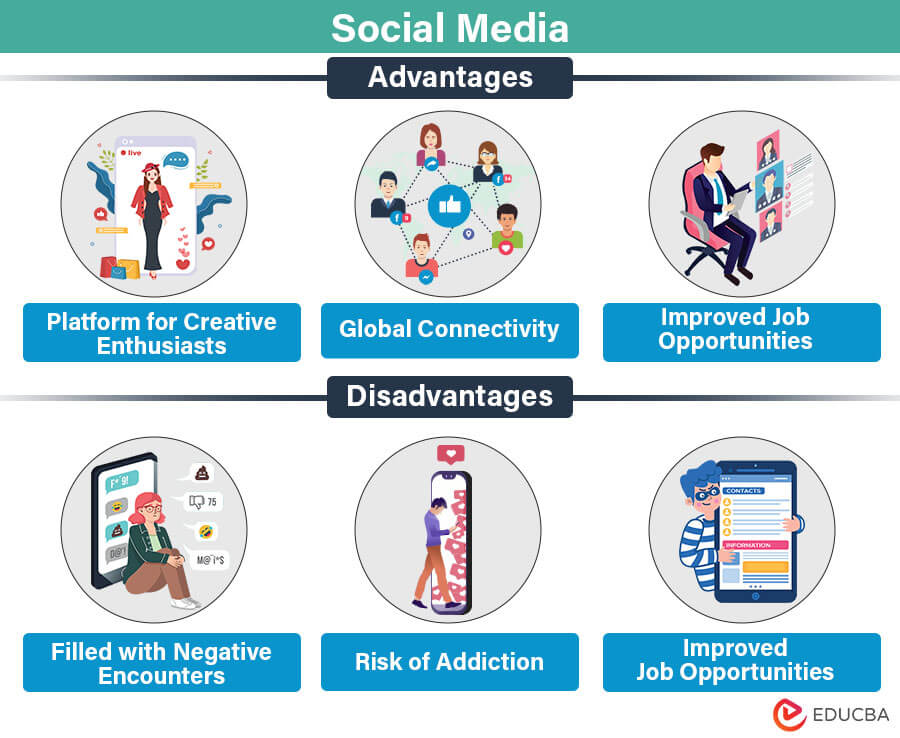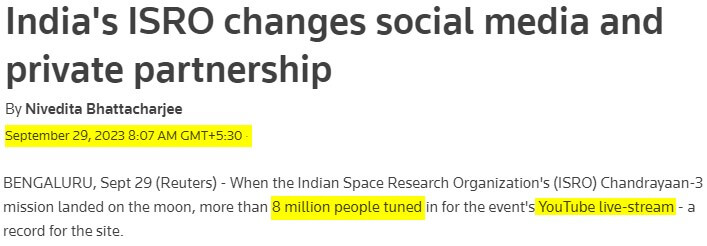Advantages and Disadvantages of Social Media – Introduction
Do you go for a morning run listening to Spotify podcasts? Do lectures on YouTube help you pass crucial exams? Do you remember the last famous TikTok dance challenge you tried? All these show how social media has become an integral part of our lives. As of October 2023, almost 61.4% of the world’s population, about 4.95 billion people, use social media. Several apps, including Facebook, Instagram, Twitter, etc., help with some parts of our lives.
It’s cool how these apps bring us together, but they have drawbacks. Thus, when we use social media, we must understand all the good and bad things it offers. So, let us see all the possible advantages and disadvantages of social media.
Top 10 Advantages of Social Media
This section lists the top advantages of social media.
#1: Lets You Connect with Anyone, Anywhere, Anytime
Social media platforms connect people from all over the world. It helps people stay in touch with friends, family, and colleagues worldwide. It also encourages global communication, allowing people to learn about different cultures and perspectives.
#2: Keeps You Updated with World Affairs
Social media platforms are valuable real-time information sources on technology, science, entertainment, and global affairs. Users can follow news channels, influencers, and organizations to stay updated in various fields. It makes it easier to access current events, trends, developments, breaking news, research findings, and updates on topics of interest.
(Image Source: Reuters)
#3: Gives Us Easy Access To Study Materials
Many educational institutions and educators use social media like YouTube to share educational resources, lectures, and study materials. It makes it easier for students to access valuable information and enhance their learning experiences.
#4: Provides Better Customer Reach For Businesses
Social media is a powerful tool businesses use to reach a wide and diverse audience. It provides an effective platform for marketing, advertising, and building brand awareness. Businesses can target specific demographics to engage with potential customers, making it an invaluable marketing channel.
#5: Acts as a Great Medium For Awareness
Social media helps us raise awareness about various issues, such as social causes, health campaigns, environmental initiatives, etc. It provides a platform for individuals and organizations to spread information and mobilize support for their causes.
#6: Offers Limitless Fun & Entertainment
Social media offers entertaining content, from funny memes and videos to live-streamed events and user-generated creative content. Platforms like YouTube, Instagram, TikTok, and Snapchat provide constant entertainment options, allowing users to relax, unwind, and enjoy content tailored to their preferences.
Moreover, for content creators trying to gain more visibility and engagement on TikTok feed, buying TikTok likes can be beneficial. This tactic can help make their content more noticeable in a crowded feed, resulting in more views. Additionally, it can increase organic engagement by signaling to the algorithm that your content deserves a larger audience.
#7: Increases Connectivity Among Global Communities
Social media can help fight feelings of isolation and loneliness, especially for people who may not have easy access to in-person social interactions. It offers a sense of connection and community, allowing individuals to find like-minded people and support networks.
#8: Offers More and Improved Job Opportunities
Many companies and recruiters use social media for job postings and talent recruitment. Job seekers can also use these platforms to network, learn about job openings, and showcase their skills and qualifications.
#9: Fantastic Platform for Creative Enthusiasts
Social media platforms offer spaces for individuals to express themselves creatively. Whether through art, writing, photography, or other forms of self-expression, it enables people to share their passions and interests with a global audience. It also promotes communities of like-minded individuals who share common hobbies and interests.
#10: Contributes to Increased Economic Growth
Social media can contribute to economic growth in various ways. It enables businesses to expand their reach and customer base, increasing sales and revenue. E-commerce businesses, for instance, benefit from social media by promoting products and services, conducting advertising campaigns, and engaging with customers to drive sales. Moreover, it facilitates entrepreneurship and small business development, as individuals can use social media to start and market their businesses with relatively low overhead costs.
Top 10 Disadvantages of Social Media
As discussed in the preceding sections, you can encounter both advantages and disadvantages of social media. Following are the top seven disadvantages of social media.
#1: Filled with Negative Encounters
Social media platforms can be a ground for negative encounters, including cyberbullying, harassment, trolling, and hate speech. These negative interactions can have a bad impact on mental and emotional well-being.
#2: Causes Extreme Distraction
Social media can be highly distracting, reducing productivity and decreasing the ability to focus on tasks or studies. Frequent notifications, scrolling through endless feeds, and the temptation to check social media during work or study hours can hamper one’s ability to stay on track.
#3: Collection of False Information
Social media often provides misinformation, fake news, and rumors that can spread rapidly. It can lead to a misinformed public and have real-world consequences, such as sharing false health information, political manipulation, or public panic.
#4: Risk of Developing an Addiction
Social media platforms are designed to be addictive, with features like endless scrolling, “likes,” and notifications that trigger dopamine release in the brain. It can lead to social media addiction, where individuals spend excessive amounts of time online, neglecting real-life responsibilities and relationships.
#5: Leads to Reduced Physical Activity
Spending too much time on social media can reduce physical activity. It involves sitting for long periods, leading to health issues like weight gain and weak muscles. It’s important to balance screen time with physical activity to stay healthy, especially for kids and teens. Set limits on social media and make sure to exercise regularly. Prioritize staying active for a healthier lifestyle.
#6: Misuse or Theft of Private Information
Social media platforms often collect and share user data, raising privacy concerns. Users may unknowingly share personal information, making them vulnerable to data breaches, identity theft, and invasive advertising practices.
#7: Decreases Personal Connection
While social media allows people to connect with others online, it can sometimes lead to a loss of meaningful in-person or face-to-face interactions. People may prioritize virtual relationships over real-world connections, potentially leading to feelings of loneliness and isolation.
#8: Fosters Lower Self-Esteem & Lack of Confidence
Social media can contribute to declining self-esteem and confidence, especially among users who constantly compare themselves to others who often show only the best parts of their lives online. The constant exposure to picture-perfect posts and filtered content can make individuals feel inadequate, leading to low self-esteem and a negative self-image.
#9: Impacts Psychological Well-being, Causing Depression
Social media excessive use links to disturbed sleep, leading to depression and sometimes memory issues. It also leads to physical symptoms and a connection between the mind and the gut, such as nausea and headaches. Research on the relationship between social media and mental health remains inconclusive and faces challenges with effects on self-esteem, particularly among young users.
#10: Projects Adverse Effects on Children
Social media can distract kids and teens from schoolwork and hanging out with friends in person. It can also expose them to inappropriate content for their age, and they might feel bad about themselves when they compare their lives to their friend’s online lives.
Social Media Infographics

Final Thoughts
There are various dimensions to the lifestyle of social media. Social media has been a great invention of the modern era, and it benefits a person in several ways. But it’s true what they say—everything in excess is harmful. People urgently need to maintain a balance between the reel and real life. This article listed the advantages and disadvantages of social media, understand the importance of both these factors, and prioritize your time and interests.
Recommended Articles
We hope that this EDUCBA information on “Advantages and Disadvantages of Social Media” benefited you. You can view EDUCBA’s recommended articles for more information,




